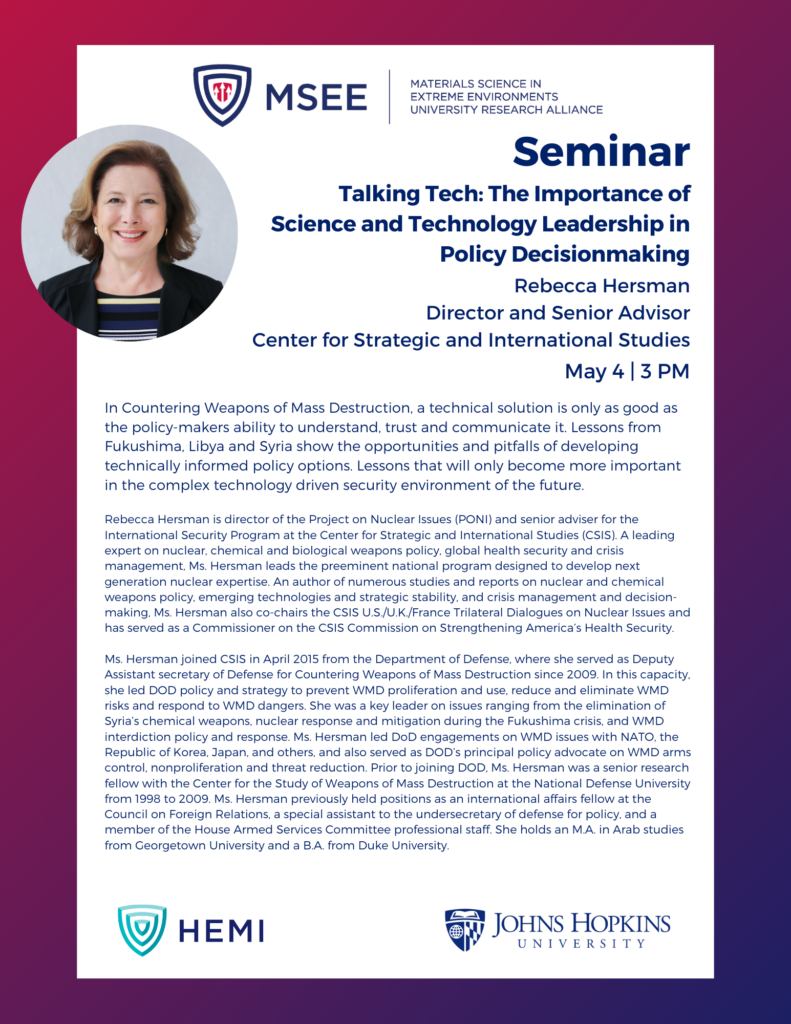May 4, 2021 @ 3:00 pm - 4:00 pm
Event Navigation
Join us for a seminar with Dr. Rebecca Hersman, director and senior advisor at the Center for Strategic and International Studies (CSIS), titled “Talking Tech: The Importance of Science and Technology Leadership in Policy Decisionmaking.”
The seminar will begin at 3pm ET on April 6, 2021.
Please contact Rachel Wise at rwise14@jhu.edu for connection information.
Abstract: In Countering Weapons of Mass Destruction, a technical solution is only as good as the policy-makers ability to understand, trust and communicate it. Lessons from Fukushima, Libya and Syria show the opportunities and pitfalls of developing technically informed policy options. Lessons that will only become more important in the complex technology driven security environment of the future.
Speaker Bio: Rebecca Hersman is director of the Project on Nuclear Issues (PONI) and senior adviser for the International Security Program at the Center for Strategic and International Studies (CSIS). A leading expert on nuclear, chemical and biological weapons policy, global health security and crisis management, Ms. Hersman leads the preeminent national program designed to develop next generation nuclear expertise. An author of numerous studies and reports on nuclear and chemical weapons policy, emerging technologies and strategic stability, and crisis management and decision-making, Ms. Hersman also co-chairs the CSIS U.S./U.K./France Trilateral Dialogues on Nuclear Issues and has served as a Commissioner on the CSIS Commission on Strengthening America’s Health Security.
Ms. Hersman joined CSIS in April 2015 from the Department of Defense, where she served as Deputy Assistant Secretary of Defense for Countering Weapons of Mass Destruction since 2009. In this capacity, she led DOD policy and strategy to prevent WMD proliferation and use, reduce and eliminate WMD risks and respond to WMD dangers. She was a key leader on issues ranging from the elimination of Syria’s chemical weapons, nuclear response and mitigation during the Fukushima crisis, and WMD interdiction policy and response. Ms. Hersman led DoD engagements on WMD issues with NATO, the Republic of Korea, Japan, and others, and also served as DOD’s principal policy advocate on WMD arms control, nonproliferation and threat reduction. Prior to joining DOD, Ms. Hersman was a senior research fellow with the Center for the Study of Weapons of Mass Destruction at the National Defense University from 1998 to 2009. Ms. Hersman previously held positions as an international affairs fellow at the Council on Foreign Relations, a special assistant to the undersecretary of defense for policy, and a member of the House Armed Services Committee professional staff. She holds an M.A. in Arab studies from Georgetown University and a B.A. from Duke University.





